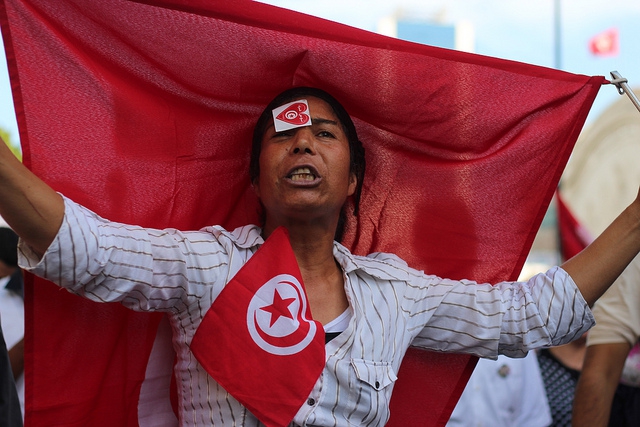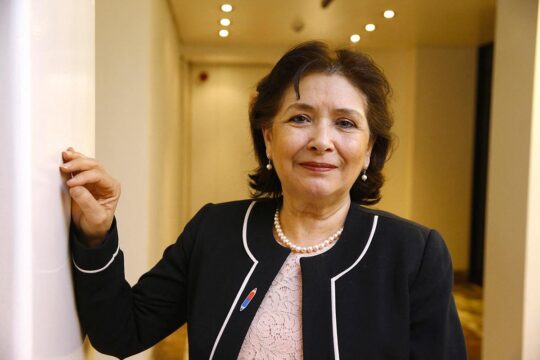Context: At the end of 2010, popular uprising in Tunisia launched it on a path to become the pioneer of the so-called Arab Spring, a wind of popular revolt against entrenched dictatorship which changed the Arab world. The uprising started on December 17, 2010, when a young street vendor named Mohamed Bouazizi set himself on fire in Sidi Bouzid in protest at harassment by the authorities.
The country had been ruled for more than 20 years by President Zine al-Abidine Ben Ali, who courted Western investment, lined his own and his family’s pockets, and kept Islamic fundamentalists at bay by putting them in jail. He also had no tolerance for free expression, keeping the media under strict control and jailing critical journalists, as well as human rights activists.
Amid continuing protests, Ben Ali was forced into exile in January 2011. An interim government was announced, but protesters were not satisfied, calling for a break with the past. Interim Prime Minister Mohammed Ghannouchi resigned in February 2011, and in March a date was announced for the election of a National Constituent Assembly (NCA) to draw up a new constitution. These elections were finally held in October 2011, and were won by the Islamist party Ennahda, although it did not get an outright majority. In December 2011, human rights activist Moncef Marzouki was elected President by the Constituent Assembly, and Ennahda leader Hamadi Jebali was sworn in as Prime Minister. The government was marked from the start by deep divisions between the Islamist and secular/ liberal camps.
Social, economic and religious tensions persisted, and Tunisia was not stabilized. Police on several occasions suppressed Islamist protests which the secular opposition said were fuelled by Ennahda.
In August 2012, thousands protested in Tunis against moves by the Islamist-led government to reduce women's rights in the draft constitution, which referred to women as "complementary to men", whereas the 1956 constitution introduced under President Bourguiba granted women full equality with men.
On February 6, 2013, opposition anti-Islamist leader Chokri Belaid was fatally shot outside his house near Tunis, prompting violent protests. Ennahda rejected opposition allegations that it was behind the killing. In July 2013, the assassination of opposition politician Mohamed Brahmi prompted more mass demonstrations, a general strike and calls for the government to resign. In October, the governing Ennahda party agreed to hand over power to a caretaker government of independent figures tasked with organizing fresh elections in 2014.
In January 2014, parliament passed a compromise constitution and in May a new electoral law.
Parliamentary elections in October 2014 brought a win for the Nidaa Tounes party (a coalition of secularists, trade unionists, liberals and some players from the Ben Ali regime), which overtook Ennahda. In December 2014, Nidaa Tounes candidate Beji Caid Essebsi won a second round of presidential elections, beating outgoing president Moncef Marzouki.
Transitional Justice Mechanisms
National Trials: In June 2011, ex-President Ben Ali was tried in absentia for theft, and sentenced to 35 years in prison. In June 2012, he was sentenced by a military tribunal, again in absentia, to life in prison over the killing of protesters in the 2011 revolution.
The trial also involved other top members of his regime, who got sentences of between 1 and 20 years. Some were also acquitted. Ben Ali is in exile in Saudi Arabia, which refuses to extradite him.
Although human rights groups welcomed the trial, they also raised concerns. For example Human Rights Watch, which observed the trial of Ben Ali and others for killing protesters during Tunisia’s 2010-2011 uprising, said that its assessment of the case “identifies positive aspects of the proceedings but concludes that legal flaws left the tribunal ill-equipped to identify those who carried out the killings and to address the culpability of high-ranking officials. It further emphasizes that such cases should in the future be heard before a civilian rather than a military court. It says that while international law does not strictly prohibit trials in absentia, Ben Ali, who was sentenced to life in prison, is entitled to a new trial if he returns to Tunisia”.
Truth and Dignity Commission (created June 2014, ongoing)
The Truth and Dignity Commission (TDC or Instance Vérité et Dignité, IVD, in French) was set up in June 2014 under the Transitional Justice Law of December 15. It is mandated to investigate gross human rights violations committed between July 1, 1955, and December 15, 2013, and “make up for the harm done to the victims”. The Commission started work in December 2014.
Its mandate covers “serious or systematic abuse of any human rights carried out by State agencies, groups, individuals on behalf of or under the protection of such State agencies,” according to the Transitional Justice Law. It also includes “all serious or systematic abuses against any human right carried out by organized groups”. Such human rights abuses include premeditated murder; rape and any form of sexual violence; torture; forced disappearance; and death penalty without fair trial guarantees.
The Commission will serve a term of 4 years, renewable for one year. It has 15 Commissioners, and is chaired by a woman, journalist and human rights activist Sihem Bensedrine.
According to the New York-based International Center for Transitional Justice (ICTJ), “the commissioners were carefully selected to represent various groups in Tunisian society, including human rights and victims associations, and those from judicial, transitional justice, and financial backgrounds”. However, some critics within Tunisian society doubt whether it will be truly impartial or say its powers are too wide.
The TDC will also play an important role in drawing up a reparations programme. It will determine the criteria for reparations to victims. The Transitional Justice Law also provides for the creation of a Fund for the Dignity and Rehabilitation for Victims of Tyranny.






